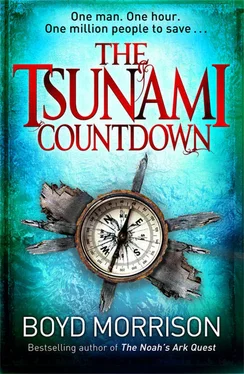If this event did turn out to be a seamount, Reggie would get the credit for discovering it. For a geophysicist, it was analogous to an astronomer finding a new comet.
“Congratulations,” Kai said. “If it turns out to be a new seamount, you’ll get journal articles out of it for the next five years.”
“Damn straight.” Reggie winked. “If you’re good to me, I might have room to put you as second author.”
“Your generosity is overwhelming.” Reggie let out a huge belly laugh at that. “But before we start celebrating,” Kai continued, “let’s make sure that we’re not dealing with a tsunami here. You’re doing the usual?”
“Other than figuring out a name for my seamount,” Reggie said, “I’m working with the NEIC to pinpoint the quake more precisely. I’m also scanning the ANSS database to check our readings against theirs.” They had a direct feed from the Advanced National Seismic System, the data source for the NEIC estimations.
Kai nodded in appreciation for how fast Reggie moved. “Good work. After Christmas Island, our next tide reading won’t be until the wave reaches Johnston Island.”
Then Kai remembered something.
“Hey, isn’t the Miller Freeman testing a new DART buoy about a thousand kilometers southeast of here?” The NOAA research vessel was responsible for maintaining all of PTWC’s oceangoing equipment.
Reggie tapped on his computer. “Yeah, they started setting it up two days ago. They should be there for another week.” He overlaid the ship’s location on the earthquake map. Before the Asian tsunami, there were only six operational DART buoys, but now new ones were coming online every few months, one of the few positive outcomes of the Southeast Asian disaster. The buoy they were currently testing was intended for the coastline of Russia.
“Is the buoy active? This might be a good test for them. At their location, they should be getting a wave reading just about the same time Johnston Island does.”
“I’ll call NOAA and have them radio the ship to be ready.”
“What do you need from me?”
The buzzer for the front gate sounded.
“You need to handle the tour group,” Reggie said, pointing toward the reception area.
“Looks like it’s showtime. Come find me when we get the tide readings from Christmas Island.”
Kai pressed the button to open the gate, then quickly assembled his presentation materials. It looked like it was going to be a busy day after all.
9:23 a.m .
Harold Franklin seethed quietly as the catamaran cruised through the water three miles west of Christmas Island. He had been looking forward to this vacation for months, primarily because of the island’s world-renowned bonefishing. Standing in the surf, casting a line, and hauling in some bonefish—that was why he was here. Not to sit on some boat with seven other people he didn’t know. Besides, he hated snorkeling. “How long are we going to be out here?” Harold said.
His wife, Gina, who was sunning on the canvas stretched between the catamaran’s hulls and nursing a piña colada, narrowed her eyes at him. “Listen, buddy, I let you plan this trip because you said we could spend some time doing things other than fishing. I’m not sitting in the hotel room every day by myself while you’re down at the beach. I should have talked you into going to Hawaii. At least there they have shopping and a decent cup of coffee.”
“But come on. Snorkeling? Do you really need me here for this?”
“At the hotel, they said this is the best reef in the area. And I don’t know anyone else here, so I don’t want to hear another word about it. You’ll get to fish plenty this week.”
“If we’re going snorkeling, then I wish we’d get it over with.”
“The captain said he got a report of some whales out here. Don’t you want to see them?”
“Whales live underwater. We won’t see anything.” It had taken Harold and Gina six hours to get from Sacramento to Honolulu, then another three hours on the one weekly flight that traveled the thirteen hundred miles due south to Christmas Island. He didn’t come all that way to watch a bump in the ocean. Harold looked up at the azure sky.
“At least it’s not raining,” he said. Just as they had set sail, they had heard a huge boom, like a gigantic thunderclap. But there hadn’t been a cloud in the sky, so the cruise left as scheduled.
“Have a drink,” Gina said. “Get comfortable like everyone else.”
Harold put his hand on her shoulder and stood up, looking back toward Christmas Island.
“What’s the matter?” Gina said.
“I don’t know. Something’s going on with the birds.”
The island was small and sparsely populated, its 3,200 residents surviving primarily as subsistence farmers and on whatever tourist dollars they could bring in. But it was so expensive and inconvenient that few tourists—mostly Americans like Harold and Gina—vacationed there. The island, an expanse of crushed coral sand only twelve feet above sea level at its highest point, provided a home for hundreds of bird species and colorful underwater life.
Because Harold was an avid hunter as well as a fisherman, the birds had caught his attention. It seemed like every bird on the island, thousands of them, had suddenly taken flight.
“What do you make of that?” Harold said to no one in particular.
By this time everyone on board was looking at the island, including the dive master and captain. Both of them were Americans who had moved to Christmas Island to start their small dive business. Captain Pete and Dive Master Dave, they called themselves, which Harold had thought a bit corny. Pete cut the motor to a crawl.
“Hey, Pete,” Dave said, “you see any smoke?”
“Nope,” Pete said. “Looks like they got spooked by something, though.”
“What about an earthquake?” Harold said. He knew from his lifetime in California that dogs and other animals could detect natural disasters before people could.
“Nope,” Pete said again. “This isn’t an earthquake zone. No volcanoes, either.”
Harold pulled out the binoculars he kept in his bag.
“We better radio in and see what’s going on,” Dave said.
As Pete called in to the shop, Harold got a closer look at the island. From this distance, even with the binoculars, the birds looked like a swarm of bees circling the island. But something else grabbed his attention.
“That’s weird,” he said.
“What?” said Gina.
“The beach is getting bigger.”
“What do you mean the beach is getting bigger?” Gina said, her voice rising in volume. Dave must have heard her.
“What about the beach?” Dave said to Harold.
Harold described what he could see. The beach, which had extended about a hundred yards from the ocean to the trees only a minute before, was growing by what seemed like the same amount every few seconds. After another moment he could see exposed reef around the entire island. Several beachgoers ran down to the newly uncovered sand, while others simply stood and watched.
“Oh, no!” said Dave. He ran over to Pete, who had just reached the dive base on the radio and asked what was happening there. Before they could reply, Dave yanked the transmitter out of Pete’s hand.
“Get the boat as far away from the island as fast as you can! Right now!” he yelled at Pete. Confused and not used to taking orders on his own boat, Pete nevertheless saw the alarm in Dave’s eyes and told everyone to hang on. He gunned the engine until they were doing twenty knots.
Dave clicked on the transmitter. “Base, this is Seabiscuit , do you read?”
A woman on the other end answered. Harold remembered her as Tasha, the girl who had checked them in for the dive. Before they’d left on the trip, Dave and Tasha’s canoodling in the shop had been practically pornographic.
Читать дальше












